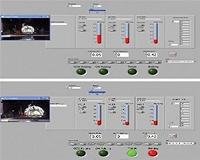| . |  |
. |
Air Force Office of Scientific Research Arlington AFB VA (AFNS) Feb 11, 2010 Air Force Research Laboratory-funded researchers at the University of Michigan invented a new type of magnetron that may be used in defeating enemy electronics. A vital component of military radar systems since World War II, a magnetron is a kind of vacuum tube that serves as the frequency source in microwave ovens, radar systems, and other high-power microwave circuits. The newly devised technology--which is more compact, exhibits faster start-up, and demonstrates higher peak and average power than current devices--should enable higher-power, higher-frequency operation and, thus, improved potential for jamming and defeat of adversarial systems. While basic magnetron design has changed little over time, the UM researchers were able to exploit established plasma physics principles in conjunction with innovative geometry to overcome the physical limitations of standard magnetrons, and in doing so, they successfully revolutionized both conventional and inverted design variations. By expanding negatively charged electrode (cathode) and positively charged electrode areas, the team produced a new device that, while more compact than current designs, permits higher currents and supplies a larger area for heat dissipation. This advance has a significant impact on Air Force radar capabilities, with the technology's higher frequencies promising improved radar resolution and its compact packaging encouraging airborne applications. Ultimately, the UM team intends to explore both a high-power version of the new magnetron and a separate, higher-frequency (i.e., millimeter-wave) embodiment. Led by UM professors Dr. Ron Gilgenbach and Dr. Y. Y. Lau, the team--which also includes members Brad Hoff (formerly of UM, now of AFRL), David French, and John Luginsland (NumerEx)--has long been a mainstay of AFRL's high-power microwave research. Internationally recognized for its scientific accomplishments, the UM group serves as an example for academia as a whole, working to establish active collaborations with AFRL counterparts and, consequently, providing a steady stream of graduates to further the realm of AF high-power microwave expertise
Share This Article With Planet Earth
Related Links USAF Office of Scientific Research The latest in Military Technology for the 21st century at SpaceWar.com
 Advanced Algorithms to Enhance Mobile Autonomous Robots
Advanced Algorithms to Enhance Mobile Autonomous RobotsEglin AFB FL (AFNS) Feb 11, 2010 Air Force Research Laboratory awarded Imagination Engines, Inc., a Phase II Small Business Innovation Research contract to develop advanced algorithms for mobile autonomous robots. The Air Force needs creative terrain-sensing and multivalued behavior-fusion algorithms for these robots due to the high uncertainty and complexity of battlefield environments. Mobile autonomous robots must empl ... read more |
|
| The content herein, unless otherwise known to be public domain, are Copyright 1995-2010 - SpaceDaily. AFP and UPI Wire Stories are copyright Agence France-Presse and United Press International. ESA Portal Reports are copyright European Space Agency. All NASA sourced material is public domain. Additional copyrights may apply in whole or part to other bona fide parties. Advertising does not imply endorsement,agreement or approval of any opinions, statements or information provided by SpaceDaily on any Web page published or hosted by SpaceDaily. Privacy Statement |